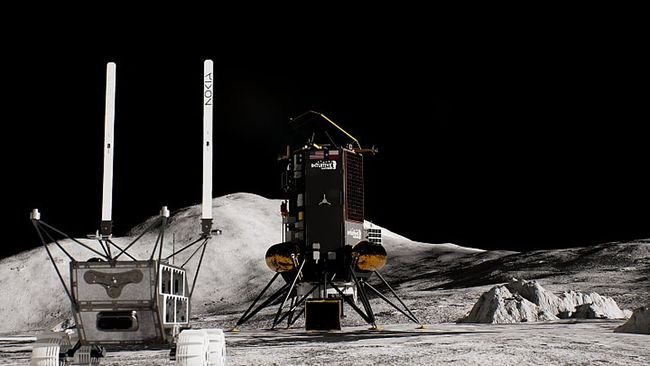If successful, this will be a single infrastructure for all lunar bases
Nokia is working to create the first mobile communications system on the Moon. The Finnish telecommunications giant is developing an LTE/4G network that will provide reliable communications for future lunar missions. A key component of this system could be launched as early as the end of the year.
As part of the Intuitive Machines IM-2 mission, special Nokia hardware will be delivered to the lunar south pole, which will link the Nova-C lunar lander, the MAPP Lunar Outpost rover and the Micro-Nova lander from Intuitive Machines, testing the network performance over both short and long distances.
Communications will be a critical component for any future mission to the Moon or Mars, along with housing, provisions and life support systems. Instead of building our own space network from scratch, we are using the same technologies that provide communications for billions of smartphones on Earth», — said Thierry Klein, President of Bell Labs Solutions Research at Nokia.
In 2020, NASA awarded Nokia a $14.1 million contract to develop a lunar cellular network as part of the Artemis program. The Finnish company is adapting ground equipment to work in lunar conditions. Nokia's lunar 4G/LTE network promises to provide much greater capacity than traditional space communications systems. This will speed up the exchange of data between both astronauts and autonomous robots on the Moon. In the future, the network could be upgraded to 5G and adapted for Mars missions.
«In the next 20 years, there will be many missions to the Moon from various space agencies and companies with bases in different regions. It would be ineffective to create a separate communication system for each. It is much more reasonable to use a single infrastructure connecting all lunar bases, — explained Thierry Klein.
However, the idea of lunar mobile Internet raises concerns among some radio astronomers. They are concerned about possible radio frequency interference from the cellular network, which could disrupt radio surveillance. However, operators like Nokia could theoretically protect certain frequencies without interfering with observatories.
If successful, Nokia's lunar 4G network will be able to provide communications for many international and commercial missions. This system can become an important infrastructure for the development of the Earth's satellite and the further expansion of humanity into space.

